新概念第二册第18课
(完整版)新概念第二册第18课语法

Lesson 18 He often does this!【New words and expressions】(3)pub n. 小酒店landlord n. 店主bill n. 帐单★pub (口语)大众酒吧,酒馆go round to the pub for a drink 去酒吧喝酒public house 酒馆bar 酒吧wineshop 酒店inn 客栈,小旅馆stay at an inn/put up at an inn 住客栈★landlord 主人,老板,房东(旅馆,家庭,公寓)landlady 女房东,女主人○1n. +n.→合成n.silk+worm → silkworm 蚕 blood+test → blood-test 验血○2adj.+n. → n.double-dealer两面派 shorthand 速记○3v.+n. → n.pickpocket 扒手 breakwater 防波堤○4n.+v-ing → n.handwriting 书法 sun-bathing 日光浴○5v.+adv. → n.get-together 联欢会 break-through 突破○6adv.+n. → n.downfall 垮台 outbreak 爆发★bill1) n. 账单,纸币 (note)pay the bill/settle the bill 付账eg. It’s wrong to leave a hotel without paying all your bills. 没有付账离开旅馆是不对的。
eg. Bill, please! 买单!2) n. 招贴,广告,海报a movie bill 电影海报eg. No bills! 禁止张贴!fit the bill/fill the bill 合乎要求head the bill/top the bill 领衔主演,挂头牌【Text】After I had had lunch at a village pub, I looked for my bag. I had left it on a chair beside the door and now it wasn't there! As I was looking for it, the landlord came in.'Did you have a good meal?" he asked.'Yes, thank you,' I answered, 'but I can't pay the bill. I haven't got my bag.'The landlord smiled and immediately went out. In a few minutes he returned with my bag and gave it back to me.'I'm very sorry,' he said. 'My dog had taken in into the garden. He often does this!'参考译文我在一家乡村小酒店吃过午饭后, 就找我的提包. 我曾把它放在门边的椅子上, 可这会儿不见了!当我正在寻找时, 酒店老板走了进来.“您吃得好吗?”他问.“很好, 谢谢. “我回答, “但我付不了帐, 我的提包没有了. “酒店老板笑了笑, 马上走了出去. 一会儿工夫他拿着我的提包回来了, 把它还给了我.“实在抱歉, “他说, “我的狗把它弄到花园里去了, 他常干这种事!”【课文讲解】1、After I had had lunch at a village pub, I looked for my bag.★Pub是public house(酒店,酒店)的缩写Let’s go to the pub for a drink.★look for 寻找(过程)eg. I am looking for my bag.look for a job 找工作find 找到(结果,不能用进行时态)eg. I found my brooch under the sofa. 我是在沙发下面找到胸针的。
新概念英语2第18课ppt课件
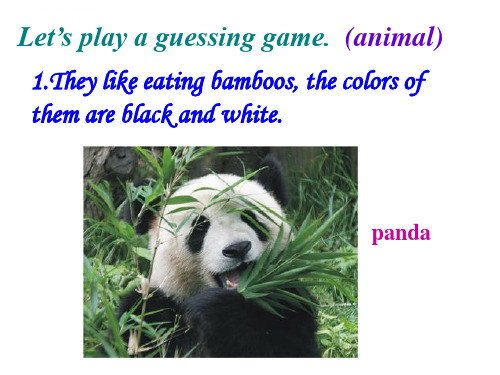
是以区(县)、乡(镇) 、村( 社区) 三级综 治中心 为指挥 平台、 以综治 信息化 为支撑 、以网 格化管 理为基 础、以 公共安 全视频 监控联 网应用 为重点 的“群 众性治 安防控 工程” 。
Today we’ll listen to a story about a woman who couldn’t find her handbag.
True or false?
1.The writer had lunch at a village pub. 2.She couldn’t find her bag after her meal . 3.She could pay the bill . 4.The landlord soon found it for her. 5.The dog had taken it into the park.
panda
“雪亮工程"是以区(县)、乡(镇) 、村( 社区) 三级综 治中心 为指挥 平台、 以综治 信息化 为支撑 、以网 格化管 理为基 础、以 公共安 全视频 监控联 网应用 为重点 的“群 众性治 安防控 工程” 。
2.They are the symbols of Australia, and they usually put their babies in the front pockets.
‘Did you have a good meal?’ he asked. ‘Yes, thank you,’ I answered, ‘but I can’t pay the bill. I haven’t got my bag.’ The landlord smiled and immediately went out. In a few minutes he returned with my bag and gave it back to me. ‘I'm very sorry,’ he said. ‘My dog had taken in into the garden. He often does this!’
新概念第二册Lesson 18
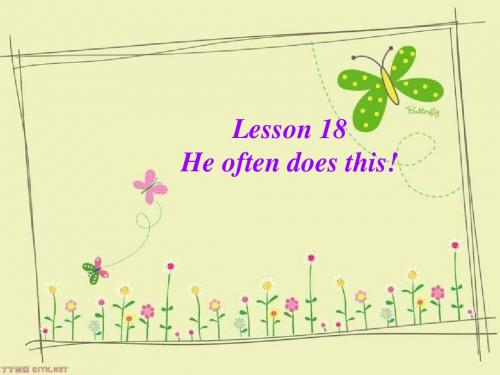
Comprehension questions
1.Where had you had lunch? 2.What did you do afterwards? 3.Had you left it on a chair or on the table? 4.Was it still there? 5.Who came in as you were looking for it?
6. ‘Did you have a good meal?’ 7. ‘Yes, thank you.’ 8. Yes, I did. 9. I hadn’t got my bag. 10. Yes, he did.
Comprehension questions
11. What did he do then? 12. How soon did he return? 13. What did he give back to you? 14. Who had taken your bag?
Lesson 18 He often dopressions
★pub n. 小酒店 n. 店主
★landlord
★bill
n. 帐单
Listen and answer
• What had happened to the writer’s bag?
• The landlord’s dog had taken the bag into the garden.
Notes on the text
• 1. look for 寻找 • 2. pay the bill 付账 • • 3. give---back 归还
• have的用法: have dinner, have a cigarette, have coffee, have a holiday, have a good time have a swim, have a rest have a pen, have a headache have做"有,患病"概念时,可作为实义动词, 也可作为非实义动词。 疑问句和否定句构成: 实义动词:通过助动词 非实义动词:直接加not • have如果一个词是以完成时态出现的,只能作 为非实义动词 .
新概念英语第二册Lesson18课件

give A back to B 上交,交给
捐赠,赠送
2024/5/30
屈服,投降 放弃 投降
give 的短语动词
2024/5/30
在…旁边
除…之外(还有…)
A besides B 除了B,还有A B+A
except A except B 从A中除去B
A-B
2024/5/30
表示“除了”的词
Lesson 18 He often does this
酒吧,酒馆
贵族,大臣,领主,勋爵 土地
业主,房东
You must pay the telephone bill. The bill will become law next year. 议案,法案 Please bill me for the books. (v.)开账单
give A back to B 把A还给B return A to B take
2024/5/30
1. have(has/had) 在完成时中做助动词 I have already had lunch. She had cleaned the room before we came home.
2024/5/30
2024/5/30
Hale Waihona Puke 2. have可以表示“有,拥有” 此时它是一个实义动词 可以和own, possess, have got进行替换 要注意have got表示“拥有”时,其中的have相当于助动词
2024/5/30
2024/5/30
洗(澡) 吃
玩得开心 收到
3. have加名词或者名词短语 表示进行和从事与这个名词相关的事情 具体意思根据名词来翻译 have a smoke
新概念英语第二册第18课
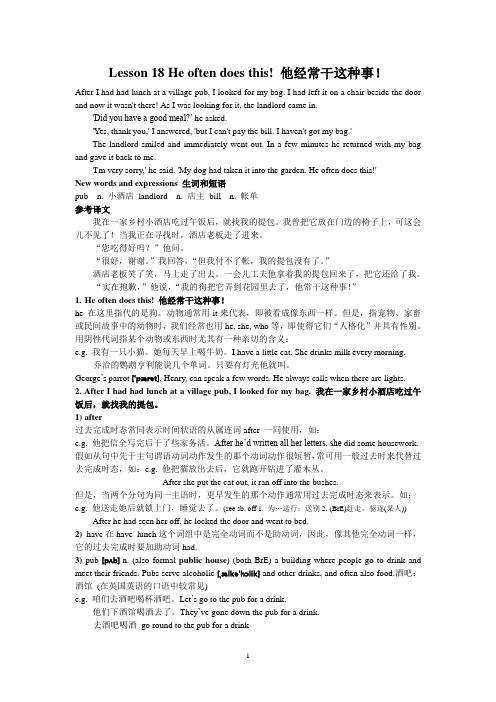
Lesson 18 He often does this! 他经常干这种事!After I had had lunch at a village pub, I looked for my bag. I had left it on a chair beside the door and now it wasn't there! As I was looking for it, the landlord came in.'Did you have a good meal?’ he asked.'Yes, thank you,' I answered, 'but I can't pay the bill. I haven't got my bag.'The landlord smiled and immediately went out. In a few minutes he returned with my bag and gave it back to me.'I'm very sorry,' he said. 'My dog had taken it into the garden. He often does this!'New words and expressions 生词和短语pub n. 小酒店landlord n. 店主bill n. 帐单参考译文我在一家乡村小酒店吃过午饭后,就找我的提包。
我曾把它放在门边的椅子上,可这会儿不见了!当我正在寻找时,酒店老板走了进来。
“您吃得好吗?”他问。
“很好,谢谢。
”我回答,“但我付不了帐,我的提包没有了。
”酒店老板笑了笑,马上走了出去。
一会儿工夫他拿着我的提包回来了,把它还给了我。
“实在抱歉,”他说,“我的狗把它弄到花园里去了,他常干这种事!”1.He often does this! 他经常干这种事!he 在这里指代的是狗。
新概念第二册 lesson 18课件(PPT26张)

As I was sleeping , a thief came in.
Language points
3.In a few minutes he returned with my bag and give it back to me. in +一段时间 ......以后(常与将来时连用)
→ I will leave for Beijing in three months. return (come back) 回来; 归还
3、have还可以表示 eat, drink,enjoy,take等意思, →have dinner/ a meal/ a cup of coffee/a good time/ a bath
Grammar
have和have got to 互换
下面三种情况,have可以被have got取代 1.I have a pen.=I have got a pen. “有” Has he a lot of money?=Has he got a lot of money? =Does he have a lot of money? 2.I have a headache. “得病”= I have got a headache. 3.have to = have got to “不得不” He had to leave early.=He had got to leave early.
1
3 2
Let's take a 10-minute break!
新概念英语第二册lesson18精品PPT课件
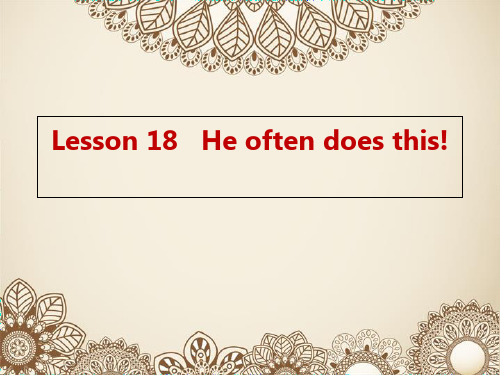
住客栈
2 landlord
(1)主人, 房东(旅馆,家庭,公寓)
(2)地主
lord n . 统治者,主人,贵族,勋爵
Lord! 天啊!哎呀!哎哟! as drunk as a lord 酩酊大醉
landlady 女主人;
3 Bill 1) n. 账单,纸币 (note)
2) n. 招贴,广告,海报
1) n. 账单,纸币 (note) pay the bill/settle the bill
付账
It’s wrong to leave a hotel without paying all your bills. 没有付账离开旅馆是不对的。
新概念第二册Lesson 18

助动词
动词
村庄
酒馆
寻找
After I had had lunch at a village pub, I looked for my bag.
I had left it on a chair beside the door and now it wasn't there!
没有
haven't got my bag. ’
一些
The landlord smiled and immediately went otes he returned with my bag and gave it back to me.
‘I'm very sorry, ’he said. ‘My dog had taken it into the
Tim has got two sisters. =Tim has two sisters.
The house hasn’t got a garden.
The house doesn’t have a garden.
1. Sarah hasn’t got / doesn’t have a car. She goes everywhere by bicycle. 2. Charles isn’t happy. He has got / has a lot of problems. 3. ‘Where’s my pen?’’I don’t know. I haven’t got/don’t have it.’
a few 修饰可数名词复数,一些,有点 few 修饰可数名词复数,否定,几乎没有 a little 修饰不可数名词 little 修饰不可数名词,否定 a lot of=losts of 修饰不可数名词&可数名次复数,相当于many/much plenty of 修饰不可数名词&可数名词复数,足够的,大量的,比a lot of 多 1.There was little food in the fridge. It was nearly empty. 2.Can I have a little milk in my coffee,please?
新概念二第18课课件ppt

目录
• 课文讲解 • 练习与巩固 • 扩展与提高 • 课堂互动 • 总结与回顾
CHAPTER 01
课文讲解
词汇学习
总结词:重要词汇
详细描述:本课涉及的词汇包括“postcard”(明信片)、“envelope”(信 封)、“stamp”(邮票)等,这些词汇是日常生活中常用的,对于提高英语实 际应用能力非常重要。
话题讨论
设计与课文主题相关的话题,让学生 进行讨论或辩论,提高口语表达的逻 辑性和条理性。
写作练习
仿写练习
让学生仿写课文中的句子或段落,注重语法和词汇的准确运 用,以提高写作的基本功。
主题写作
设计与课文主题相关的写作任务,让学生进行创作,提高写 作的创意和表达能力。
CHAPTER 04
课堂互动
小组讨论
详细描述
在游戏互动中,学生通过参与各种游戏来学 习课程内容。这种方式能够让学生在轻松愉 快的氛围中学习知识,提高学习效果。同时 ,游戏互动还能够培养学生的团队协作和竞 争意识,增强学生的综合素质。
CHAPTER 05
总结与回顾
本课重点回顾
01
02
03
04Βιβλιοθήκη 掌握一般现在时的用法,了解 其与一般过去时的区别。
VS
详细描述
在角色扮演中,学生根据课程内容扮演不 同的角色,通过模拟场景来展示课程内容 。这种方式能够增强学生的参与感和体验 感,帮助学生更好地理解课程内容,提高 学习效果。同时,角色扮演还能够培养学 生的表演和表达能力,增强学生的综合素 质。
游戏互动
总结词
游戏互动是一种寓教于乐的课堂互动方式, 能够激发学生的学习兴趣和积极性。
CHAPTER 03
新概念第二册Lesson 18知识要点总结

新概念第二册Lesson 18复习要点一.L18词汇讲解:1.pub 小酒店bar 酒吧book bar 书吧/tea bar 茶吧/ internet bar 网吧ndlord 店主land 土地lord 领主Lord of Ring 指环王3.bill 账单pay the bill 付账Bill,please./Check, please.结账。
二.重难点:1.have got/has got 有/得了某种疾病,当have 或者has 的意思是“有,得病”的使用,可以互换2.give up 放弃,投降give in 投降/上交give away 送人区分give in 和give up 的不同:The soldiers lost the battle but they didn’t give themselves up . 士兵们输掉了战斗,但是他们没有投降。
The soldiers didn’t give in.士兵们没有投降。
3.a village pun 村庄的小酒馆an apple tree 一棵苹果树a woman doctor 一位女医生注意:two apple trees /two women doctors4.look for 强调动作或者过程find强调结果类比:look at/see listen to/hear put on/wear。
5.leave sb. sth/leave sth. for sb.给某人留下某物6.return的含义返回:He’ll return to his country in 2 years.他两年之后会回来。
返还,偿还:I’ll return your money soon.我会很快还你的钱。
7.几个“除......之外”的词和短语:besides/except/apart from/except fromapart from和except for 可用于句首。
新概念英语第二册Lesson18Heoftendoesthis!讲义

新概念英语第二册Lesson 18He often does this!他经常干这种事!After I had had lunch at a village pub, I looked for my bag. I had left it on a chair beside the door and now it wasnt there! As I was looking for it, the landlord came in. "Did you have a good meal?" he asked. "Yes, thank you, "I answered," but I cant pay the bill. I haven‘t got my bag." The landlord smiled and immediately went out. In a few minutes he returned with my bag and gave it back to me."I’m very sorry," he said. “ My dog had taken it into the garden. He often does this!”【课文翻译】After I had had lunch at a village pub, I looked for my bag.我在一家乡村小酒店吃过午饭后,就找我的提包。
I had left it on a chair beside the door and now it wasnt there!我曾把它放在门边的椅子上,可这会儿不见了!As I was looking for it, the landlord came in.当我正在寻找时,酒店老板走了进来。
Did you have a good meal?" he asked.“您吃得好吗?”他问。
新概念二18课课件

语法讲解
总结词:深入浅
详细描述:本课的语法重点是现在完成时态,通过例句和练习,让学生深入理解现在完成时态的用法,包括其构成、时间状 语、与一般过去时的区别等。
课文翻译
总结词:准确流畅
详细描述:本课的课文是一篇关于集邮的文章,介绍了集邮的乐趣和意义。在翻译过程中,需要准确 传达原文的意思,同时保持流畅的中文表达。
02
通过听力和口语练习, 提高听力和口语能力
03
阅读和写作练习,培养 阅读和写作技巧
பைடு நூலகம்
04
学习英国文化和社会习 俗,了解英国人的生活 方式和价值观
02 新概念二18课概述
课文内容
课文标题
新概念二18课
主题
请求和建议的表达方式
课文内容
本课主要介绍了如何用英语表达“请求”和“建 议”的常用表达方式,包括礼貌地提出请求或建 议、表达自己的想法和意愿,以及如何回应他人 的请求或建议。
详细描述
语法练习包括选择题、填空题、改错 题等题型,旨在帮助学生更好地掌握 新学的语法知识,提高语言表达能力 。
课文填空
总结词
课文填空是一种综合性练习,通过填空的方式帮助学生巩固课文内容,加深对 课文的理解。
详细描述
课文填空练习通常会提供一篇课文的缩写版本,并留出一些空格供学生填写, 填写的内容可以是单词、短语或句子,旨在帮助学生更好地理解课文内容,提 高阅读理解能力。
04 练习与巩固
词汇练习
总结词
词汇练习是巩固新学词汇的重要 方式,通过词汇练习,学生可以 加深对单词的理解和记忆。
详细描述
词汇练习包括单词拼写、单词造 句、同义词替换、反义词辨析等 题型,旨在帮助学生更好地掌握 新学的单词,提高词汇量。
新概念英语第二册第18课ppt课件

采用PP管及配件:根据给水设计图配 置好PP管及配 件,用 管件在 管材垂 直角切 断管材 ,边剪 边旋转 ,以保 证切口 面的圆 度,保 持熔接 部位干 净无污 物
• The landlord smiled and immediately went out. In a few minutes he returned with my bag and gave it back to me. 'I'm very sorry,' he said ' My dog had taken it into the garden. He often does this.'
• beside (prep.) = next to
• As I was looking for it, the landlord 采用PP管及配件:根据给水设计图配置好PP管及配件,用管件在管材垂直角切断管材,边剪边旋转,以保证切口面的圆度,保持熔接部位干净无污物 came in.
• as = when = while 当…时候 • 过去进行时:was ∕were + doing • come in = enter • 'Did you have a good meal ?' he
asked. • have a good meal
'Yes, thank you,' I answered,
'but I can't pay the bill. 采用PP管及配件:根据给水设计图配置好PP管及配件,用管件在管材垂直角切断管材,边剪边旋转,以保证切口面的圆度,保持熔接部位干净无污物 pay the bill I haven't got my bag.‘ have = have got = own = possess • The landlord smiled and immediately went out. • Immediately • = at once = right now = right away • = in no time = in a minute
新概念英语第二册lesson18

• You can do what you like. I will never give in. 4.give up doing sth. 放弃,抛弃
• He gave up drinking a few years ago. 5.give up 交出,让出
• leave除了“离去,离开,出发” 的意思,还可以表示“把(人、 物)留下,遗留,丢下”等。
• Have you left anything in the car?
I had left it on a chair beside ( 在…旁边)the door.
• Leave a.”离开””出发” • leave for sth 离开去某地 • b.把(人、物)留下、丢下、遗留等。 He will leave Chongqing他要离开重庆。 He will leave for Chongqing 他要离开去重庆
• He must be very fond of animals to have five dogs. 他一定非常喜欢动物,才会养 五条狗.
Have 的用法 (2)实义动词。拥有 have=have got
• =own,possess 拥有 • He owns a farm = He possess a
• Jack has given up the watch he stole last week. • Three of our officers gave themselves up to the enemy. 我
方的三名军官向敌人投降了。
• 3、'I'm very sorry,' he said. 'My dog had taken in into the garden. He often does this!'
新概念第二册18课have用法

新概念第二册18课have用法小朋友们呀,今天咱们来好好讲讲新概念第二册第18课里的have的用法。
have这个词可神奇啦。
在课文里,我们能看到它有好多不同的意思呢。
比如说,have可以表示“有”。
就像我有一个可爱的小宠物狗,I have a lovely pet dog。
它的毛软软的,眼睛黑溜溜的。
每次我放学回家,它就摇着尾巴跑过来。
这时候的have就是说我拥有这个小狗狗。
还有哦,have能用来表示吃或者喝。
想象一下,在炎热的夏天,我们have an ice - cream(吃一个冰淇淋)。
那冰冰凉凉的冰淇淋,甜甜的味道在嘴巴里散开,可舒服啦。
或者早上的时候,我们have a glass of milk(喝一杯牛奶),牛奶白白的,香香的,喝下去感觉肚子暖暖的。
have也能表示经历某种事情。
比如说,我们去游乐园玩,就可以说We have a great time at the amusement park(我们在游乐园度过了很棒的时光)。
在游乐园里,我们坐过山车,风呼呼地吹在脸上,心都提到嗓子眼儿了;我们还去看小丑表演,小丑穿着五颜六色的衣服,做着各种滑稽的动作,逗得我们哈哈大笑。
这就是have a great time,也就是经历了一段很开心的时光。
在课文里呀,还有have to的用法。
have to就是“不得不”的意思。
就像我们每天都have to go to school(不得不去上学)。
不管是刮风还是下雨,我们都得背着小书包去学校。
我记得有一次下大雨,路上到处都是小水坑,我穿着小雨靴,小心翼翼地走着,但是我还是得按时到学校,因为这是我们have to做的事情。
再比如说,我们的妈妈每天have to do housework(不得不做家务)。
妈妈要扫地,灰尘在扫把下乖乖听话;妈妈要洗碗,油腻的碗在妈妈的手下变得干干净净。
这就是have to,是一种责任或者是被要求做的事情。
小朋友们呀,have这个词是不是很有趣呢?它就像一个百变精灵,在不同的句子里有不同的样子,有着不同的作用。
新概念英语第二册18课ppt课件
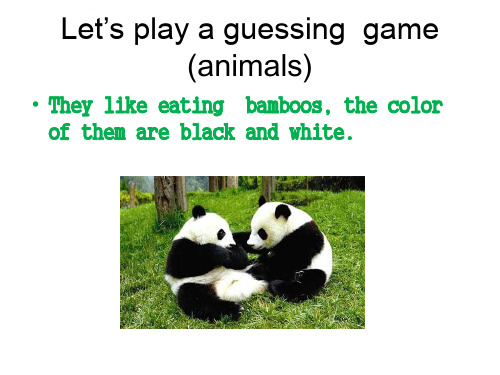
经营者提供商品或者服务有欺诈行为 的,应 当按照 消费者 的要求 增加赔 偿其受 到的损 失,增 加赔偿 的金额 为消费 者购买 商品的 价款或 接受服 务的费 用
现在完成时
• ①现在完成时 表示过去某时发生的某一动作对现在造 成影响或者是结果 I have finished reading the book .我已经读完这本书了。
过去完成时态
• ①过去完成时态表示在过去某一时刻或者动作以前已经完 成。即过去的过去。
我昨天已经完成我的作业了。 I had finished my homework yesterday . ②表示由过去的某一时刻开始,一直延续到过去另一时刻的
动作或者状态。 After he came back ,I had lived in Xiamen for 2 years .
give in =hand in 上交 投降 Though the problem is hard but I won’t give in.
give up give up smoking Do the exercise in page 82.
经营者提供商品或者服务有欺诈行为 的,应 当按照 消费者 的要求 增加赔 偿其受 到的损 失,增 加赔偿 的金额 为消费 者购买 商品的 价款或 接受服 务的费 用
• 'Did you have a good meal?" he asked. • 'Yes, thank you,' I answered, 'but I can't pay the
bill. I haven't got my bag.' • The landlord smiled and immediately went out.
新概念英语2_第18课
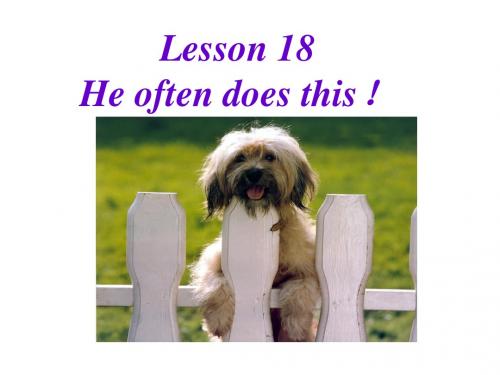
3.have可译为“拥有”=have got.但have got常用于一般现 在时,其他时态中用have. 在英式英语中,have用法与be相同,即可以不用助动词 do/does/did进行否定和疑问。 Eg: He has a pen.—He hasn’t a pen.—Has he a pen?— Yes ,he has.—No, he hasn’t.
The landlord smiled and immediately went out. In a few minutes he returned with my bag and gave it back to me. ‘I'm very sorry,’ he said. ‘My dog had taken it into the garden. He often does this!’ 1. immediately 立刻,马上 同义词:at once, instantly, right away, straight away 2. in a few minutes 几分钟后 类似的说法: in a few days in a few weeks in a few months in a few years
I had left it on a chair beside the door and now it wasn’t there! 1.leave ---left---left a.离开,出发 leave sp离开某地 leave for sp出发去某地 Eg:他要离开重庆。 He will leave Chongqing. 他要出发去重庆。 He will leave for Chongqing. b.把(人、物)留下、丢下、遗留等。 Eg: Have you left anything in the car? 2. beside: prep.在…旁边 Eg:他的汽车正停在那辆卡车的旁边。 His car is parking beside the truck.
新概念英语第二册18课ppt课件
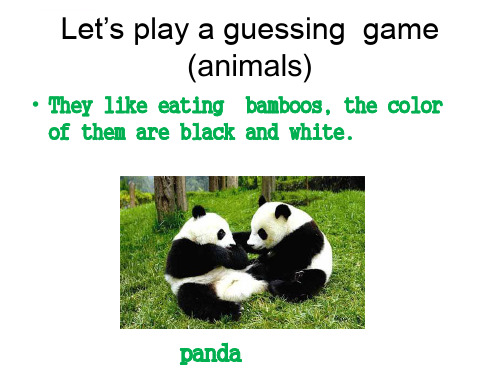
“雪亮工程"是以区(县)、乡(镇) 、村( 社区) 三级综 治中心 为指挥 平台、 以综治 信息化 为支撑 、以网 格化管 理为基 础、以 公共安 全视频 监控联 网应用 为重点 的“群 众性治 安防控 工程” 。
“雪亮工程"是以区(县)、乡(镇) 、村( 社区) 三级综 治中心 为指挥 平台、 以综治 信息化 为支撑 、以网 格化管 理为基 础、以 公共安 全视频 监控联 网应用 为重点 的“群 众性治 安防控 工程” 。
giraffe
“雪亮工程"是以区(县)、乡(镇) 、村( 社区) 三级综 治中心 为指挥 平台、 以综治 信息化 为支撑 、以网 格化管 理为基 础、以 公共安 全视频 监控联 网应用 为重点 的“群 众性治 安防控 工程” 。
Lesson18 He often does this!
“雪亮工程"是以区(县)、乡(镇) 、村( 社区) 三级综 治中心 为指挥 平台、 以综治 信息化 为支撑 、以网 格化管 理为基 础、以 公共安 全视频 监控联 网应用 为重点 的“群 众性治 安防控 工程” 。
“雪亮工程"是以区(县)、乡(镇) 、村( 社区) 三级综 治中心 为指挥 平台、 以综治 信息化 为支撑 、以网 格化管 理为基 础、以 公共安 全视频 监控联 网应用 为重点 的“群 众性治 安防控 工程” 。
ssing
game
(animals)
• They like eating bamboos, the color of them are black and white.
The dog had taken it into the garden.
“雪亮工程"是以区(县)、乡(镇) 、村( 社区) 三级综 治中心 为指挥 平台、 以综治 信息化 为支撑 、以网 格化管 理为基 础、以 公共安 全视频 监控联 网应用 为重点 的“群 众性治 安防控 工程” 。
新概念英语第二册课件Lesson18

have a cup of tea 5.组成复合结构即“have+宾语+宾语补足语”
You'd better give up smoking. 放弃 give away the prizes 颁发 give the secret away 泄露 出卖,赠送
give in give off give out
The strikers wouldn't give in.投降,屈服 The flower gives off a good smell.发出(光,味道等等)
A. on
B. at
C. in
D. during
5. My grandfather was born ____ Oct. 10, 1935.
A. on
B. in
C. at
D. of
6. The train is starting ___ five minutes.
A. in
B. at
C. for
D. still
表示延续时间的介词 他已经当老师9年了。 He has been a teacher __f_o_r_ nine years.
我已经在这儿住了10年了。 I have lived here _s_in_c_e_ ten years ago.
---No. We can have a game of table tennis.
A. on
B. in
C. out
新概念英语第二册Lesson18课件

Let’s watch a short video and find out how the dog is.
Listening Studio
ThWe lahnadtlohrda’d hs daopgpheandetdakteon tthheebwagriitnetro’thes gbaardge?n.
leave还可以作名词,表示“休假,假期”。 My best friend, Joan is spending her leave in Hawaii. 我最好的朋友琼正在夏威夷度假。
I had left it on a chair beside the door and now it wasn’t there!
I had left it on a chair beside the door and now it wasn’t there!
leave的用法
v. 离开(某处) Mr. Smith left the room at two o’clock. 史密斯先生两点离开房间的 。v. 留下;丢下;落下(常表示事物落在/忘在某处) Better take off your shoes and leave them outside. 最好把鞋子脱掉,放在外面。 v. 留给;交给(一般与介词with或to搭配) We didn’t find him and left word with his neighbour. 我们没有找到他,于是留了口信给他的邻居。
Reading Land
Read and learn.
After I had had my lunch at a village pub, I looked for my bag. I had left it on a chair beside the door and now it wasn’t there! As I was looking for it, the landlord came in.‘Did you have a good meal?’ he asked.‘Yes, thank you,’ I answered, ‘but I can’t pay the bill. I haven’t got my bag.’The landlord smiled and immediately went out. In a few minutes he returned with my bag and gave it back to me.‘I’m very sorry,’ he said. ‘My dog had taken it into the garden. He often does this!’
- 1、下载文档前请自行甄别文档内容的完整性,平台不提供额外的编辑、内容补充、找答案等附加服务。
- 2、"仅部分预览"的文档,不可在线预览部分如存在完整性等问题,可反馈申请退款(可完整预览的文档不适用该条件!)。
- 3、如文档侵犯您的权益,请联系客服反馈,我们会尽快为您处理(人工客服工作时间:9:00-18:30)。
Lily has a fever. I have a stomachache =I have got a stomachache.
Have 的用法 (3)固定短语 • have a bath/ drink/ look/ conversation 洗个澡、喝一杯、看一下、聊一会、 • have a good =enjoy oneself 玩得开心 • have dinner / lunch / breakfast
in+ 时间段 “多长时间以后” in a few minutes in a few days in a few weeks in a few months in a few years
Two different “had”s
After I had had lunch …,I looked for my bag.
summary
1. 现在完成时 “have + 过去分词” 过去完成时 “had + 过去分词” 2. 拥有 have = have got = own = possess 得病 have = have got headache / fever 3. 固定短语
Beside and besides Beside 介词 表“在…旁”“在…附近” The car is parking beside the truck. We live beside the library. Besides a. 介词 表”除…之外(包括 还)” E.g. Besides this subject, we have another two subjects. There are a lot of people at the party besides us.
Multiple choice questions 1- b 2- d 3- b 4- d 5- b 6- c 7- d 8- c 9- a 10- c
He often does this. He/she都可用来指Pets
I looked for my bag。
look for “寻找”(强调找的过程) Find “找到”, 强调寻找的结果。
e.g.我在寻找一个快速致富的方法。 a way to get rich I’m looking for quickly. ---Can you find a football in our classroom? ---We are looking for it.
Have 的用法 (1)助动词,构成完成时 现在完成 have/has + done. • I have finished my homework. • China has held Olympic Games. 过去完成 had+ done • When I rang, Tim had already left.
Have you left anything in the car? 你有把东西漏在车里吗?
As I was looking for it, the landlord came in. As = when 当…时候, As I was sleeping ,a thief came in.
In a few minutes he returned with my bag and gave it back to me.
3.Who had taken the writer’s bag? The dog
After I had had lunch at a village pub, I looked for my bag. I had left it on a chair beside the door and now it wasn’t there! As I was looking for it, the landlord came in. “Did you have a good meal?” he asked “Yes, thank you,” I answered, “but I can’t pay for the bill. I haven’t got my bag.” The landlord smiled and immediately went out. In a few minutes he returned with my bag and gave it back to me. “I’m very sorry,” he said. “My dog had take it into the garden. He often does this!”
Lesson18
He often does this!
Listen and answer
1. Where had I left my bag?
On a chair beside a door 2. Why can’t the writer pay for the bill?
Because he can’t fiபைடு நூலகம்d his bag.
Have 的用法 (2)实义动词 1) “ 拥有” have=have got=own=possess
• He has a farm = He owns a farm =He has got a farm
I have got a pair of small eyes.
Have 的用法 (2)实义动词 have=have got 表示“生病”
Give的几个 固定搭配
Give 及物动词,后接名词作宾 语。常表示“给予”“交给” Eg. Give me the book. please give it to me. a.Give back.“归还” Give it back to me.
Give in “上交,呈交” Give in your homework. C. Give away.”捐赠,赠送” E.g. He gave away all his money to the society. d. give up. “放弃, 抛弃”
I had left it on a chair beside the door.
leave.”离开””出发” leave for … 离开去某地 He will leave Chongqing他要离开重庆。 He will leave for Chongqing 他要离开去重庆 把…留下、丢下、遗留等
